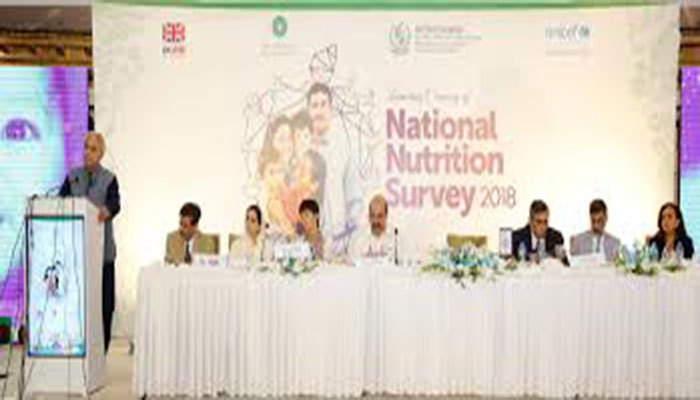40pc under-5 children in Pakistan are stunted: nutrition survey
ISLAMABAD: Four in ten under-five children in Pakistan are stunted, nearly two out of ten children under five suffer from wasting, and 13% of the children between 2-5 years of age suffer from some form of functional disability, informs the National Nutrition Survey (NNS) 2018 released here Tuesday.
Offering an unambiguous picture of the country’s nutritional status, the survey findings were rightly referred to by UNICEF Representative Aida Girma as being “a wake-up call to a clear and present emergency.” With the magnitude of the problem continuously expanding, Pakistan is doubtlessly beset with a nutrition crisis of historic proportions.
Led by the Ministry of Health, the survey was carried out by the Aga Khan University, with support from the United Kingdom and UNICEF. Dr. Zulfiqar Bhutta, Founding Director of the Centre of Excellence in Women and Child Health, Aga Khan University, shared the survey findings at a ceremony attended by the PM’s Special Assistant on Health Dr. Faisal Sultan, government officials, and the media, with officials of UN and other international organizations participating through virtual link.
According to the survey, one in every eight adolescent girls and one in every five adolescent boys are underweight, and over half of the adolescent girls in Pakistan are anemic. Women of reproductive age also bear a triple burden of malnutrition—14% are undernourished, which reflects an improvement compared to 18% in 2011, while overweight and obesity has increased from 28% in 2011 to 38% in 2018.
“Malnutrition remains at the forefront of the government’s agenda. It is essential to cascade high-level commitments into policies that benefit the masses. The Prime Minister has directed my Ministry to lead in intersectoral coordination and advocacy as well as policy and planning for nutrition. For this purpose, a Nutrition Advisory Group has been constituted to provide technical oversight and guidance on nutrition policy and programming,” Dr. Faisal stated as chief guest.
The survey shows that along with stunting, wasting is also widespread in the country with districts in Khyber Pakhtunkhwa, Sindh and Newly Merged Districts of KP having more prevalence than other provinces. “It is established that the foundation for stunting is laid before the child is 24 months of age. This means that preventive measures need to be taken before the child reaches this age and the mother’s health should receive special attention to avoid stunting,” Dr. Faisal added.
The Deputy Director Development British High Commission, Jim Carpy hoped that the results of the survey will help tackle the issue of malnutrition by targeting those most affected. “We will continue to work with Pakistan to improve maternal and child health and ensure adequate nutrition for all,” he assured.
Aida Girma highlighted the need for high-level attention and adequate funding to reduce mortality due to malnutrition and to ensure that every child reaches her/his full development potential. “Strengthening the health system to deliver preventative and curative nutrition services at scale is imperative,” she said.
Earlier, Director Nutrition Dr. Baseer Achakzai informed that the survey assesses the nutritional status of 115,500 households across Pakistan and is the largest-ever nutrition survey conducted in the country. Director General Health Dr. Malik Safi hoped that that the findings would be effectively utilized for decision making, planning, and implementation of nutrition interventions.
-
 Everything We Know About Jessie J's Breast Cancer Journey
Everything We Know About Jessie J's Breast Cancer Journey -
 Winter Olympics 2026: What To Watch In Men’s Hockey Today
Winter Olympics 2026: What To Watch In Men’s Hockey Today -
 Winnie Harlow Breaks Vitiligo Stereotypes: 'I'm Not A Sufferer'
Winnie Harlow Breaks Vitiligo Stereotypes: 'I'm Not A Sufferer' -
 Apple Martin Opens Up About Getting 'crazy' Lip Filler
Apple Martin Opens Up About Getting 'crazy' Lip Filler -
 Why Did OpenAI Remove One Crucial Word From Its Mission Statement?
Why Did OpenAI Remove One Crucial Word From Its Mission Statement? -
 Prince William Warned His Future Reign Will Be Affected By Andrew Scandal
Prince William Warned His Future Reign Will Be Affected By Andrew Scandal -
 Amy Madigan Reflects On Husband Ed Harris' Support After Oscar Nomination
Amy Madigan Reflects On Husband Ed Harris' Support After Oscar Nomination -
 Is Studying Medicine Useless? Elon Musk’s Claim That AI Will Outperform Surgeons Sparks Debate
Is Studying Medicine Useless? Elon Musk’s Claim That AI Will Outperform Surgeons Sparks Debate -
 Margot Robbie Gushes Over 'Wuthering Heights' Director: 'I'd Follow Her Anywhere'
Margot Robbie Gushes Over 'Wuthering Heights' Director: 'I'd Follow Her Anywhere' -
 'The Muppet Show' Star Miss Piggy Gives Fans THIS Advice
'The Muppet Show' Star Miss Piggy Gives Fans THIS Advice -
 Sarah Ferguson Concerned For Princess Eugenie, Beatrice Amid Epstein Scandal
Sarah Ferguson Concerned For Princess Eugenie, Beatrice Amid Epstein Scandal -
 Uber Enters Seven New European Markets In Major Food-delivery Expansion
Uber Enters Seven New European Markets In Major Food-delivery Expansion -
 Hollywood Fights Back Against Super-realistic AI Video Tool
Hollywood Fights Back Against Super-realistic AI Video Tool -
 Meghan Markle's Father Shares Fresh Health Update
Meghan Markle's Father Shares Fresh Health Update -
 Pentagon Threatens To Cut Ties With Anthropic Over AI Safeguards Dispute
Pentagon Threatens To Cut Ties With Anthropic Over AI Safeguards Dispute -
 Samsung Galaxy Unpacked 2026: What To Expect On February 25
Samsung Galaxy Unpacked 2026: What To Expect On February 25




